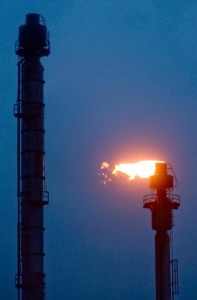Shell Agrees to Pay Over $115 Million to Settle Clean Air Act Violations in Houston

Photo by Matthew HINTON/AFP/Getty Images
An oil refinery stack flaring.
Federal agencies announced Wednesday that Shell Oil has agreed to pay $115 million to install pollution controls at their refinery and chemical plant in Deer Park, Texas to resolve alleged violations of the Clean Air Act. On top of that, the company will pay a $2.6 million civil penalty, and spend another million installing a monitoring system to detect benzene levels at the edges of the plant, which are near a neighborhood and school. The Environmental Protection Agency (EPA) says those levels will be available to the public online.
The major spending for pollution controls will be on reducing and cleaning up flaring, a process where gases are burned off. As StateImpact Texas has reported, flaring of waste near fenceline communities like the one in Deer Park is suspected to have detrimental health effects and in some cases create dangerous conditions. The EPA says Shell will “recover and recycle” waste gases (it isn’t clear how much), which the agency says is the first time a chemical refinery has agreed to do so.
EPA says the new agreement will reduce pollution and carbon dioxide emissions.
“This case is part of EPA’s nationwide enforcement effort to protect fenceline neighborhoods by significantly reducing toxic pollution from flares and making information about pollution quickly available to affected communities,” said Cynthia Giles, assistant administrator of EPA’s Office of Enforcement and Compliance Assurance, in a statement.
More from the EPA:
“Today’s settlement is part of EPA’s national effort to reduce emissions of toxic air pollutants, with a particular focus on industrial flares. These requirements focus on reducing the amount of waste gas sent to flares and on improving flare operations, both of which work to reduce toxic emissions. Improper operation of an industrial flare can send hundreds of tons of hazardous air pollutants into the air. The more waste gas a company sends to a flare, the more pollution occurs. The less efficient a flare is in burning waste gas, the more pollution occurs. EPA wants companies to flare less, and when they do flare, to fully burn the harmful chemicals found in the waste gas.”
The Shell refinery is the 11th largest refinery in the U.S.
